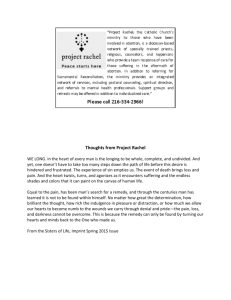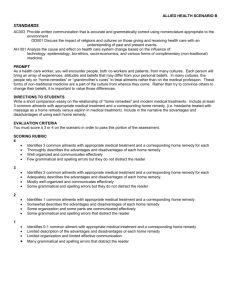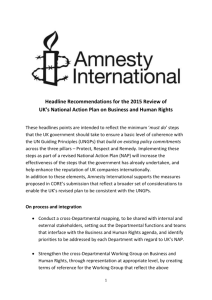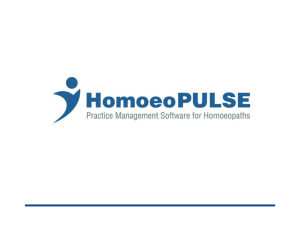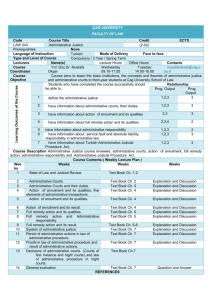Obstacles to effective remedy in cases of corporate abuse of human
advertisement
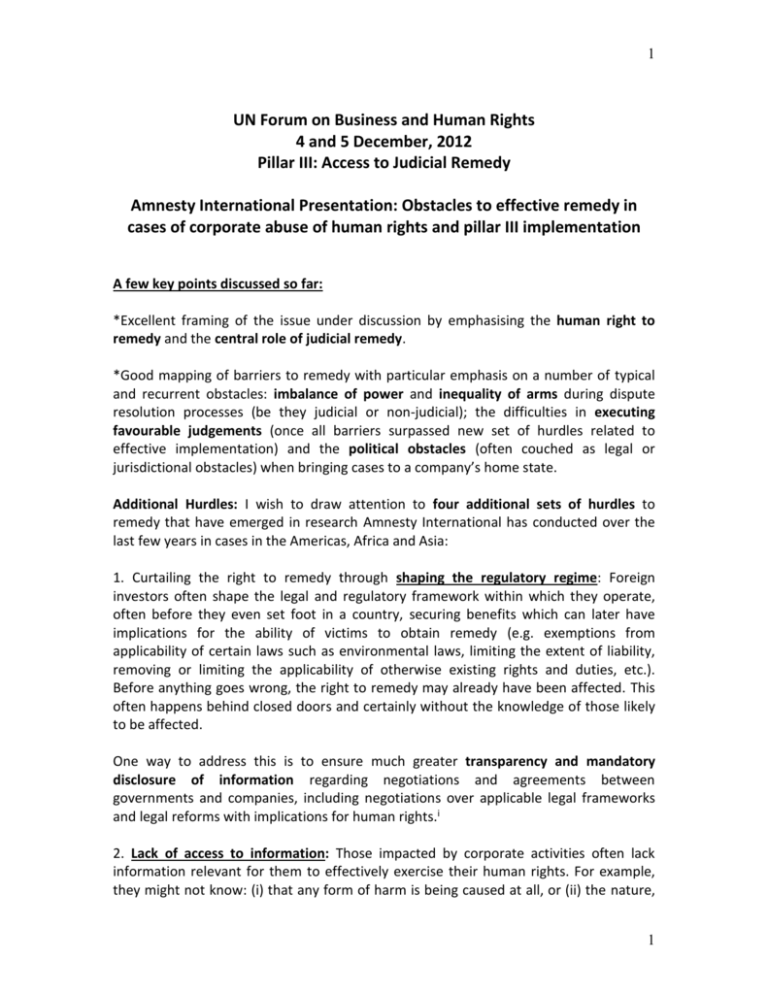
1 UN Forum on Business and Human Rights 4 and 5 December, 2012 Pillar III: Access to Judicial Remedy Amnesty International Presentation: Obstacles to effective remedy in cases of corporate abuse of human rights and pillar III implementation A few key points discussed so far: *Excellent framing of the issue under discussion by emphasising the human right to remedy and the central role of judicial remedy. *Good mapping of barriers to remedy with particular emphasis on a number of typical and recurrent obstacles: imbalance of power and inequality of arms during dispute resolution processes (be they judicial or non-judicial); the difficulties in executing favourable judgements (once all barriers surpassed new set of hurdles related to effective implementation) and the political obstacles (often couched as legal or jurisdictional obstacles) when bringing cases to a company’s home state. Additional Hurdles: I wish to draw attention to four additional sets of hurdles to remedy that have emerged in research Amnesty International has conducted over the last few years in cases in the Americas, Africa and Asia: 1. Curtailing the right to remedy through shaping the regulatory regime: Foreign investors often shape the legal and regulatory framework within which they operate, often before they even set foot in a country, securing benefits which can later have implications for the ability of victims to obtain remedy (e.g. exemptions from applicability of certain laws such as environmental laws, limiting the extent of liability, removing or limiting the applicability of otherwise existing rights and duties, etc.). Before anything goes wrong, the right to remedy may already have been affected. This often happens behind closed doors and certainly without the knowledge of those likely to be affected. One way to address this is to ensure much greater transparency and mandatory disclosure of information regarding negotiations and agreements between governments and companies, including negotiations over applicable legal frameworks and legal reforms with implications for human rights.i 2. Lack of access to information: Those impacted by corporate activities often lack information relevant for them to effectively exercise their human rights. For example, they might not know: (i) that any form of harm is being caused at all, or (ii) the nature, 1 2 scale and depth of that harm, (iii) who to claim against and for what. They often struggle to access documents and evidence necessary to prove a claim in court, e.g. the damage or its nature and extent. Often this information is in the hands of the corporate defendant who will not release it. One way to address this problem is to require the mandatory disclosure of key information relating to: corporate structures, environmental, social and human rights impacts (e.g. impact assessments), and companies’ plans to address these impacts (risk management plans). Specific laws can be used to facilitate disclosure of this information: for example, effective Freedom of Information legislation with a scope that extends to information held by private actors when this information is relevant for the effective protection of human rights (e.g. information on water uses or risks of water contamination, as this is relevant for the effective protection of right to water; information on composition of toxic substances, as this is relevant for the effective protection of the right to health, etc.). Improved procedural rules on access to information and discovery within the context of litigation can also help. These rules should take into account the difficulties of claimants in cases against corporate defendants in accessing corporate-held information. Good examples already exist within certain legal systems. 3. Arguments relating to separate legal personality: The problem created by the separate legal personality between different members of the same corporate group and importantly between parent companies and their subsidiaries, who each retain their own assets and liabilities. Under the separate legal personality doctrine it is argued that the liabilities of a subsidiary cannot automatically be attributed to the parent company. This is so even if this company is the sole owner or a majority shareholder of the subsidiary, and even when in practice the parent company might be in total control of the activities of its subsidiary or of aspects that might be connected to the abuse (such as health and safety or security). Multinational corporations often raise the separate legal personality doctrine as a defence against liability. Companies should be placed under an express duty to prevent human rights abuses or a duty of care towards individuals and communities whose human rights are affected by the activities of the subsidiaries or other entities they have the ability to control. The standard of care must be defined by reference to a human rights due diligence process genuinely focused on the prevention of human rights abuses; and implemented in an robust, transparent and participatory manner. 4. Jurisdictional challenges. When individuals attempt to bring a lawsuit in the company’s home state, they might face jurisdictional hurdles. In the USA and Canada one such challenge is the doctrine of forum non conveniens (through which companies argue that there is a more convenient forum to hear the case). Forum non conveniens can take years to litigate, it can drain claimants and their lawyers of already scarce resources; and due to narrow interpretations by the courts that do not take human 2 3 rights concerns sufficiently into account, it often ends with a rejection of the case altogether. The doctrine of forum non conveniens should be applied restrictively in extraterritorial human rights litigation when the alleged corporate related human rights abuse has occurred abroad. In their assessment of the most convenient forum to litigate a case, courts must ensure the protection of human rights and the realisation of the right to remedy in particular are preliminary and overriding considerations. These assessments must go beyond establishing the mere aptitude of the host state judiciary to hear the case, and consider other significant elements such as the extent to which the alternative court is able to operate independently and efficiently, the existence of a legal cause of action, of legal aid and suitable legal representation, the availability of effective remedies and the particular circumstances of the parties, potential for intimidation, risks to safety, etc. Final remarks on UNGP implementation *In implementing the UNGP, States must place much greater emphasis on Pillar 3 than they have so far and on their duty to ensure effective remedy to victims of corporate related human rights abuses. *An important step to this end is to understand the barriers to justice affecting victims seeking judicial remedy, particularly in the Home State. We have often found in discussions about remedy the overt or implied proposition that barriers to judicial remedy are so many and so insurmountable that the solution lies in finding alternative means of redress, often of less quality and with fewer safeguards than the courts can provide, if working well. * The State duty to provide effective remedy entails a duty to remove barriers. It also entails not taking regressive measures such that will make access to the courts even harder. We have seen how some governments have recently done exactly that: the UK recently passed the Legal Aid, Sentencing and Punishment of Offenders Bill (that eliminates a number of arrangements that made claims against UK companies financially viable) ii and we have also seen the regressive interpretations of the applicability of ATCA in extraterritorial human rights litigation in the USA advanced in the joint UK-Netherlands amicusiii and the more recent US submission.iv *This forum is also concerned about effective implementation of pillar 2, the corporate responsibility to respect human rights. Effective implementation of pillar 2 by companies will be driven to a considerable extent by the real prospect of successful legal claims against them in courts. *On the contrary, for as long as there are no real prospects of successful legal claims against companies for their alleged involvement in human rights abuses, there is no real 3 4 incentive for them to implement pillar 2 in any meaningful way. Pillar 3 is not just about guaranteeing access to remedy to victims; it is about ensuring companies comply with their responsibility to respect human rights and therefore is also about prevention of human rights abuses. *Amnesty International hopes to see concrete initiatives by governments to implement pillar 3 and help guarantee access to judicial remedy in particular, and we hope that the Working Group will assist them in this objective. i Confidentiality clauses should be avoided; if included they should be narrow in scope and subject to review. Two reforms are particularly problematic: 1. The elimination of “success fees” payable by the losing defendant (and a cap of 25% on any success fees), and; 2. Non-recoverability of “after the event” insurance premiums from losing defendants. iii They claim, firstly, that corporations are not directly liable under international law; secondly, cases brought under the ATCA engage an overly broad assertion of extraterritorial civil jurisdiction, contrary to international law. The UK and Netherlands are opposing a law that allows victims of grave human rights abuses to seek a limited form of remedy in the US. iv The Government argues that in this case, in which the alleged primary tort-feasor is a foreign sovereign and the defendant corporations accused of collaborating in the human rights abuses belong to a third country, the USA cannot be thought responsible for affording a remedy while the nations directly concerned could. U.S. courts “should not create a cause of action that challenges the actions of a foreign sovereign in its own territory, where the [sued party] is a foreign corporation of a third country that allegedly aided and abetted the foreign sovereign’s conduct,” http://sblog.s3.amazonaws.com/wp-content/uploads/2012/06/Kiobel-US-supp-brief-6-13-12.pdf ii 4
